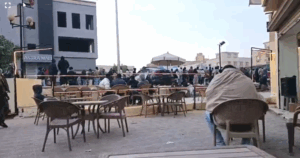Deaths and injuries as another UNAMID site is looted in North Darfur
Two people were killed and eight others sustained injuries when a former United Nations-African Union Mission in Darfur (UNAMID) site was looted on Saturday in Shangil Tobaya, Dar El Salaam locality, south of El Fasher in North Darfur.
 The handover of a UNAMID team site in El Malha, North Darfur, in 2017 (Mohamad Almahady/UNAMID)
The handover of a UNAMID team site in El Malha, North Darfur, in 2017 (Mohamad Almahady/UNAMID)
Two people were killed and eight others sustained injuries when a former United Nations-African Union Mission in Darfur (UNAMID) site was looted on Saturday in Shangil Tobaya, Dar El Salaam locality, south of El Fasher in North Darfur.
Video clips showed the looting of properties at the UNAMID site with the sounds of bullets being fired from the tasked guard forces. Sources told Radio Dabanga that the site was subjected to looting and sabotage as people took objects from the site to an unknown destination with carts and donkeys.
The site was handed over to the Government of Sudan on May 25. It was the last of 14 deep field sites handed over to the Sudanese government. At the time, the North Darfur government and the Sudanese government’s joint task force strongly reconfirmed their commitment to ensure civilian use of the former site.
The Shangil Tobaya site is not the first UNAMID site to be looted. Since the mission ended its mandate at the end of last year, various former UNAMID sites were handed over to local authorities to be used as schools or training centres, among other things. Several of those have been looted since.
In February, a site in North Darfur’s Saraf Omra that was earmarked for use as a vocational training centre was looted and ‘levelled’ just weeks after it was handed over to the Sudanese government.
UN Secretary-General António Guterres publicly condemned the looting at the time and said: “at a time when community needs in Sudan are increasingly pressing, the site was intended to serve as a vocational training centre; unknown assailants have dashed that opportunity”.

In 2019, the UNAMID headquarters in West Darfur were looted and vandalised on the evening of the official handover by a crowd that allegedly included Sudanese police and men in military uniforms.
Later that year, the UNAMID site in Nyala, capital of South Darfur, was looted a month after its official handover to the state’s government. The South Darfur government agreed to give the ‘super camp’ to the University of Nyala and the police administration in South Darfur, but this never happened.
At the time, a Forces for Freedom and Change (FFC) member explicitly accused the acting governor and the South Darfur government of systematically organised the theft. “We wrote to the governor regarding the delay of handing over the property to the university and the police, and he responded that the transfer has already happened. Then we contacted the university and they told us that they have received nothing,” he said.
Protests and fears
The United Nations ended the UNAMID mandate at a time when many Darfuris protested the exit plans out of fear that the security in Darfur would decrease when the mission left. Thousands of displaced people from Kalma camp in South Darfur staged a weeks-long sit-in in front of the UNAMID office in the camp.
In March, the Sudanese Professionals Association (SPA) in North Darfur warned of increased insecurity in North Darfur with the absence of security forces in the state after the UNAMID forces proceeded with their withdrawal.

Since the withdrawal of the mission, deadly tribal clashes have taken place throughout Darfur, often between tribes that were supported by former dictator Omar Al Bashir and those that were prosecuted by them*.
West Darfur’s capital El Geneina, for example, was engulfed by deadly violence twice this year. In April, over 144 people died and in January at least 163 people were killed as Arab herdsmen again targeted Masalit people, a sedentary African tribe.
Last month, the newly appointed governor of Darfur and head of the Sudan Liberation Movement, Minni Minawi, said that the tribal conflicts in Darfur “must cease forever” and that “there are hands working in igniting this strife, whether they are from the old regime or others, there are people who benefit from this war”.
*Darfur has a long history of strife between often Arab herding tribes and non-Arab African herders or sedentary farmers, which were exploited by the previous regime of dictator Omar Al Bashir who supported the Janjaweed militia that carried out many attacks on farmers. Al Bashir employed these militias, largely made up of Arab nomads, to repress a revolt over ethnic discrimination in the region, mainly targeting non-Arab African farmers. According to the UN, the conflict left at least 300,000 people dead and displaced more than 2.5 million.











 and then
and then